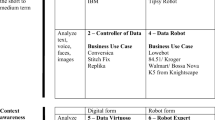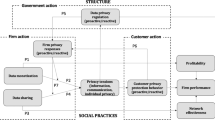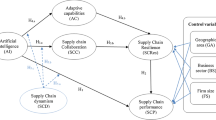Abstract
The industries of Japan have developed by learning from Western industries, especially the USA, and by implementing many of their concepts and technologies. However, Japanese industries have often implemented these concepts and technologies in a very different way from the USA. For example, while the USA uses information systems in retail industries as a tool by which data are collected and analysed to ‘control the market’, in Japan this same technology is considered rather as a learning device to ‘interpret the market’. While in the USA the market is seen as a natural phenomenon capable of being controlled, the Japanese see it as an ambiguous phenomenon that is ever changing and is not capable of being controlled. Rather it is important to feel the change in the market itself.
This paper introduces human centredness to the information system, and argues against modern rationalism, i.e. human versus technology, taking the case of use of POS data from the POS system (point of sale: a system that collects data on both the customer and goods sold by scanning bar codes that are attached to the surface of the goods) by the eminent Japanese retailer, Ito-Yokado. It emphasises an interactive concept of interaction between human and technology of the postmodern paradigm.
Similar content being viewed by others
References
Checkland, P. (1981). Systems Thinking, Systems Practice. Wiley, Chichester, UK.
Checkland, P. and Scholes, J. (1990). Soft Systems Methodology in Action. Wiley, Chichester, UK.
Gill, K.S. (1996). Human Machine Symbiosis. Springer, London.
Kimura, B. (1972). Hito to hito tono aida [Between Humans: Psychiatric Japanology]. Kobundo, Tokyo.
Kimura, B. (1994). Guzensei no seishin byori [The Psychiatry of Contingency]. Iwanami Shoten, Tokyo.
Shimada, H. (1988). Hyumanuea no Keizaigaku: Amerika no nakano nihon kigyo [Humanware Economics: Japanese companies in the USA]. Iwanami Shoten. Tokyo.
Shimada, H. and MacDuffie, J. (1986). Industrial Relations and ‘Humanware’:Japanese Investments in Automobile Manufacturing in the United States. Discussion paper, MIT Sloan School.
Uchiyama, K. (1994). Why do Data Implementation and Organization Improvement Happen at the Same Time? InProceedings of the Annual Conference of JASMIN, Tokyo.
Uchiyama, K. (1996). Reinterpreting SSM and its Role in Organizational Analysis in Information Systems Work: A Japanese Perspective. MSc dissertation, Lancaster University.
Uchiyama, K. (1997). The Reconciliation Between “Reality” and “Actuality”: A Model of Decision Making by Using Safe Systems Methodology (SSM), (Eds.) Wilby, J. & Gregory, W. Human Consciousnes and Decision Making, The University of Hull.
Uchiyama, K. (1999). Reinterpreting Soft Systems Methodology (SSM): Introducing Actuality into the Field of Management and Information Systems Studies, phD Dissertation, University of London.
Wylie, D. (1989). Ito Yokado. HBS case study N9-589 116. Harvard Business School, Boston, MA.
Author information
Authors and Affiliations
Corresponding author
Rights and permissions
About this article
Cite this article
Uchiyama, K. Towards the appropriate human-centred information systems: A case study of the Japanese retail industry. AI & Soc 12, 287–295 (1998). https://doi.org/10.1007/BF01179800
Issue Date:
DOI: https://doi.org/10.1007/BF01179800




